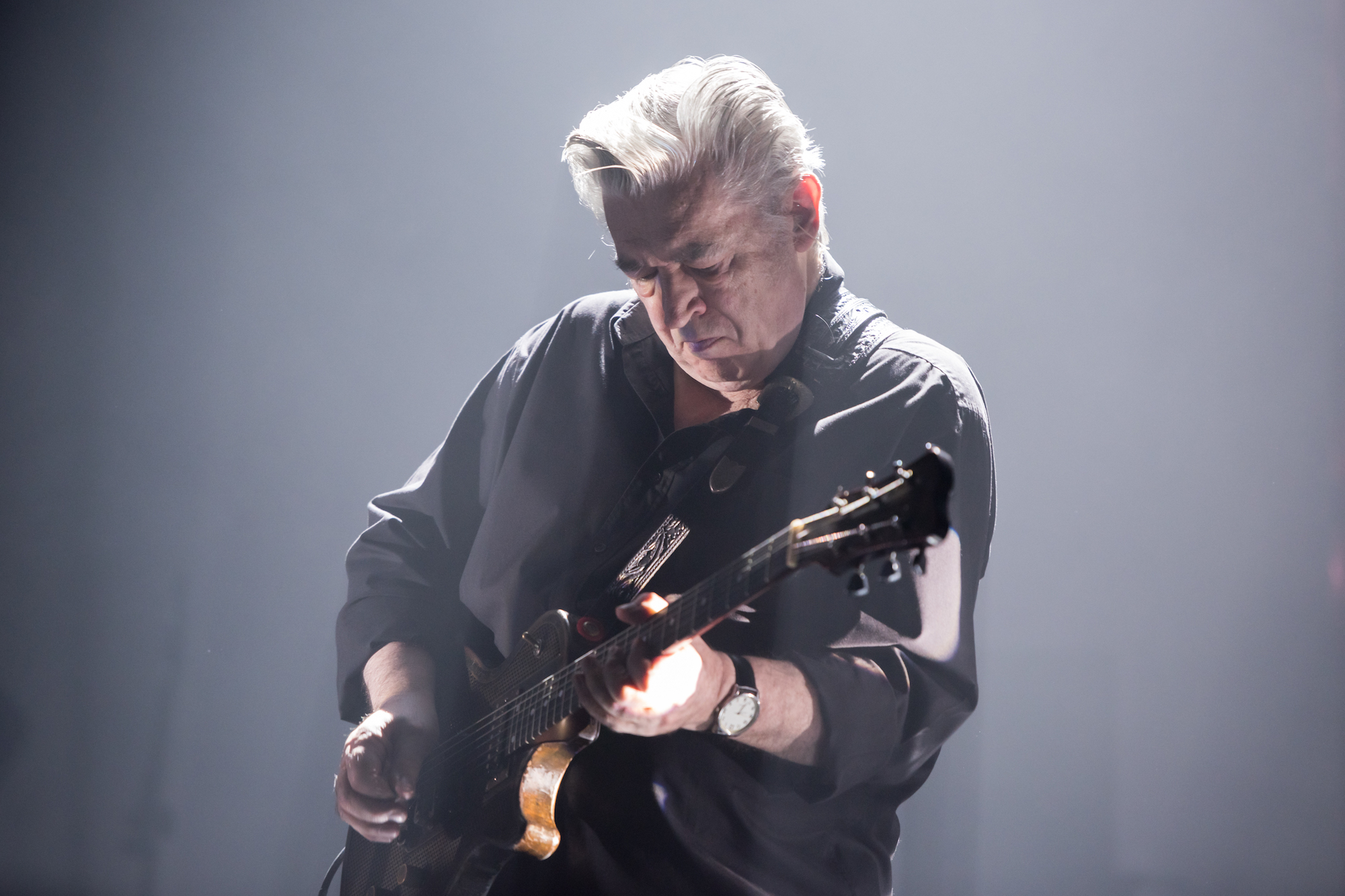“I went to Mickie Most's office with an acoustic guitar and played it. It was almost like one of those clichéd movie moments: he said, ‘That’s going to be a hit!’”: Session guitar ace Chris Spedding reveals the stories behind five of his best songs
A long-standing sideman to Roxy Music frontman Bryan Ferry and the late Robert Gordon, Chris Spedding is a master of tasteful playing – just don't expect him to spend too much time looking back at his voluminous discography

Chris Spedding’s long career has seen him move from first-call session musician for 1960s pop producers to solo chart success at the height of the U.K. glam-pop scene, in 1975. In later years, his most visible role for U.S. audiences has been as Robert Gordon’s longest-standing collaborator. Along the way, he contributed to many of the biggest-selling solo albums by Roxy Music frontman Bryan Ferry.
For someone with such an extensive catalog, Spedding has a surprising admission. “I don’t really listen to anything that I’ve played on,” he says. “For about 99 percent of it, there’s always something I wish I’d done better. I did record It’s So Easy to Fall In Love a few years ago for a tribute to Buddy Holly, where I played an extended solo that I look back on as really great. That’s probably a favorite of mine, but it’s not actually on any of my own albums.”
Spedding applied the same sense of perfectionism to the work he did for other artists. “Time constraints were always an issue, and I would usually be the only one who wasn’t satisfied,” he explains. “I’d go by the reaction of the people that I was working with though. If they were happy, then that was the most important thing.
“I learned early on not to ask if I can go for another take as, invariably, it often wasn’t as good as the first one anyway. Really, you’re just happy that you’re getting the work and people like what you’re doing.”
Spedding admits he’s often worried about where his next job will come from. “I’ve been feeling like that for 50 years,” he says with a laugh. “I’ve never had the sort of success that means that I could retire. I’ve always got to work. Fortunately, something usually crops up.”
For that matter, he says, “I would never turn work down. It didn’t matter who it was. The thing is that you just don’t know what you’re going to get when you arrive at the studio. You never get enough information to even consider whether it’s an artist that you’d want to work with. Of course, things often don’t pan out the way you expect. Something that seems unlikely to be good could turn out to be the best thing you ever did.”
A trawl through Spedding’s canon reveals that there is very little acoustic-based work in it.
“I don’t particularly like acoustic guitar,” he says. “I used to hate being booked on acoustic sessions, which is why I eventually bought a really nice old Gibson J-200 from the ’50s. I bought it in London in the early ’70s for £300, which was an amazing price. I fell in love with the look of it when I saw Elvis playing one in Loving You. I’ve always thought a guitar should look great.”
Spedding has found that age has taken a toll on his hand strength and has begun to affect some of his technical considerations.
“My hands are not feeling as strong as I’ve reached my late 70s, and I found I was struggling to bend a 10-gauge string up a tone. I switched down to a nine and realized why I’d never used that gauge before, as the tone just wasn’t there and there was a lot of loss of volume. Instead, I’ve adjusted my playing so that I do the bigger bends on the B string and kept the 10 on the top.”

Following Robert Gordon’s passing in late 2022, one of Spedding’s semi-regular partnerships came to an end. Since then, he’s been expanding his horizons.
“I’ve got some jazz/gospel shows with Sarah Brown on vocals coming up,” he says, “and I’m thinking about a possible new studio album. A friend of mine is compiling a few tracks with different beats, which might be a new approach.” Spedding is also waiting for Bryan Ferry to return to the road.
“We were in the middle of a tour when the pandemic hit, so I haven’t worked with Bryan for a while, but I’m hoping he’ll call soon to do something. I’m also playing on a War of the Worlds tour sometime next year.” (Spedding was one of the musicians on the 1978 album Jeff Wayne’s Musical Version of The War of the Worlds, based on the Jules Verne book, which has toured since 2006.)
For Spedding, session work is still a big part of his career, even nearly 60 years down the line. “I still do a few sessions, but I record from home these days. It’s funny how much the business has changed. You need to be very proactive to get work, but fortunately I’m still getting by.”
Elastic Rock – Nucleus (Elastic Rock, 1970)
“I picked this one because it was one of the few featured solos that I recorded in the jazz idiom. Up to this point I’d mainly been doing rock sessions, but I’d done some jazz-fusion things. That genre was fairly new for British jazz musicians in those days, and it was almost like they wanted to have a token rock element – which was where I came in. [laughs] The rest of Nucleus were total jazzers, and I quite liked bringing that element of rock to the music.
“My solo here is a good example of where I was trying to bring my own style to their music, and I think I did a good job of bringing something outside of the usual jazz ideas while remaining true to the jazz spirit. I never really got a chance to do any further jazz sessions after this, as I had so many rock and pop sessions.
“In the ’60s, I was a bit of a jazz snob. I was a big fan of Jim Hall and thought I brought a sense of that to my solo on this song. I think this was a Les Paul into a Fender Deluxe Reverb, which was my go-to rig at that time. I’ve still got that amp.”
Motor Bikin' – Chris Spedding (Chris Spedding, 1976)
“I’d just left Sharks [the British rock band formed in 1972 by former Free bassist Andy Fraser], and I was wondering what I was going to do next. I’d worked with Mickie Most before I’d joined the Sharks. He was a hugely successful producer in the U.K. in the ’60s and ’70s, with countless hit singles to his credit.
“We always got on really well together. We were always on the same page. I thought that if I could come up with a commercial song, it would stand a good chance of being a hit if I could get Mickie involved. I’d written songs that I thought were commercial enough to be hits before, but they weren’t, because I didn’t do them right. [laughs]
“I went to Mickie’s office with an acoustic guitar and played it for him. It was almost like one of those clichéd movie moments: He said, ‘That’s going to be a hit!’ [laughs] And of course, for the one time in my life, it was.
“It was Mickie’s idea to put a solo on it, and I decided to use different chords from the rest of the song for that bit. Afterward, I thought it would be interesting to add a harmony guitar playing an interval of a third for part of it, which seemed to give it an extra lift.”
Silver Bullet – Chris Spedding (Hurt, 1977)
“I picked this one because it was quite a different groove from the rest of the tracks on the album – almost a country-rock feel. I really like the solo that I did at the end of it. I was trying to play very melodically rather than just playing guitar licks. I think there’s a certain elegance about that melody.
“I used my Flying V for a lot of the songs on this album – I’d been photographed with it and used it on TV shows when I had the hit with Motor Bikin’, but it wasn’t my primary studio guitar. My profile was quite high around the time that this album came out, and I was getting a lot of airplay and TV appearances. Although the singles didn’t make the charts, it’s definitely one of my most successful solo albums.
“It’s kind of humbling when you realize that it’s not that easy to score a hit single.
I’d had short hair and been wearing leather jackets and ’50s clothes for a few years when I did the U.K. pop shows with Motor Bikin’, and every other act on the show would have long hair, platform shoes, and flares. It was funny that by the time that punk really hit, I suppose my image fit in well again. Although it wasn’t an image as such; it was just the way that I looked every day.”
This Is Tomorrow – Bryan Ferry (In Your Mind, 1977)
“I think Bryan knew he got the best out of me when we did a spontaneous first-take for this track. I was presented with the backing track – I didn’t actually play the slide guitar part on this one – and I was asked to come up with a solo. I immediately came up with what you hear on the record; I didn’t spend time working anything out. The chord sequence was actually a bit like a ’30s jazz-pop song, so I could relate to that quite easily anyway. I guess the solo ended up being like another hook in the song.
“Of course, in Bryan’s position, he could always call up another guitarist if he didn’t like what I was coming up with, but I was in a good period with him at that time, and I did a lot of work with him, so I must have been doing something right. [laughs] I liked the way the solo made a strong, distinctive melodic statement in the middle of a pop song. It was very direct, with a theme that developed as the solo progressed.”
Counterfeit – Chris Spedding (Enemy Within, 1986)
“I’d recorded this one previously for I’m Not Like Everybody Else, an album that came out in 1980. That was the last thing that I did with Mickie Most, and I’m not too keen on how it sounded. I very rarely redo a song, but I didn’t think I got this one right the first time.
“I had done a demo of Counterfeit at home, for which I had plugged my guitar directly into my Revox tape recorder. But then when I recorded it with Mickey, for some reason I didn’t replicate that direct-in sound, and I think that became the thing that the track was missing.
“This time out, for the Enemy Within version, I plugged a Les Paul directly into the board, and I think the sound and performance are much better than the first time that I recorded it. I like the simplicity of the riff, which is just played on the top two strings. I also enjoy the boneheaded, punky simplicity of the song.
“When I’d finished it, I think I knew enough about songwriting not to mess around with it and overcook things – to just leave it in a good place, rather than cleaning up and standardizing the length of verses and choruses. I’m pretty happy with it.”
- Chris Spedding is currently on tour in the United States. For a full list of dates, visit his website.
Get The Pick Newsletter
All the latest guitar news, interviews, lessons, reviews, deals and more, direct to your inbox!
Mark is a freelance writer with particular expertise in the fields of ‘70s glam, punk, rockabilly and classic ‘50s rock and roll. He sings and plays guitar in his own musical project, Star Studded Sham, which has been described as sounding like the hits of T. Rex and Slade as played by Johnny Thunders. He had several indie hits with his band, Private Sector and has worked with a host of UK punk luminaries. Mark also presents themed radio shows for Generating Steam Heat. He has just completed his first novel, The Bulletproof Truth, and is currently working on the sequel.
“We’d heard Jimi Hendrix, we'd heard the Who, but now we finally got to see these guys. And watching Jimi Hendrix burn his guitar….” Grace Slick on Hendrix at Monterey, Jefferson Airplane and the Spanish origins of “White Rabbit”
“I’m still playing but I’m covered in blood. Billy’s looking at me like, ‘Yeah! That’s punk rock!'” Steve Stevens on his all-time worst gig with Billy Idol — and the visit to Jimi Hendrix's grave that never happened










